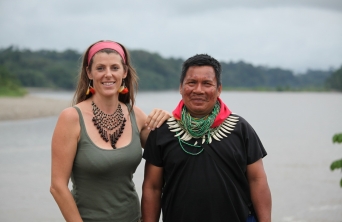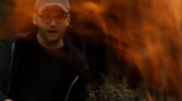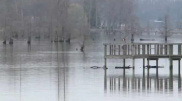Zoë Tryon Joins The Intervention
Zoë Tryon was born into a well-known, socialite family in England, but she was always intrigued by the rustic rather than the refined things in life.
After studying anthropology at Manchester University, she left to explore the Amazon jungles and get hands-on experience among indigenous Ecuadorian tribes, such as the Waorani, Cofán, Siona, Secoya, and Kichwa.
However, to know Ecuador is to know the havoc oil has wrecked upon the region. And well before Tryon began spending time there, widespread degradation of their ecosystem had already been unfolding for decades due to oil production.
The more she learned, the more Tryon knew she had to take action. She became an ambassador for the preservation of their ecosystem, working with human rights and environmental protection groups like Amazon Watch and the Pachamama Foundation. She also leads talks and tours of the area she's come to love, showcasing the beauty within the jungle and its communities, while also featuring evidence of its contamination and pollution.
Tryon spent some time with Counterspill to discuss the significance of Chevron's lawsuit, upcoming legal battles, and the spiritual effect oil has had on the Amazon.
CS: So how about this settlement with Chevron?
Well it isn’t over yet. Chevron has now proclaimed that they’re not going to sue, and the settlement amount is much, much less than what was originally demanded. It started at $23 billion, and another independent analyst said something like $120 billion. And when the $8 billion [actual judgement amount] is compared to what Chevron makes in a year, it’s a pittance, really. But what they’re trying to do is just create a precedent about big oil and introduce some accountability back into the system.
CS: What’s your stance on the issue?
I wouldn’t say that I’m anti-big oil. I understand that it’s going to take us a long time to get off of non-renewable energy. What I am is anti-irresponsible and reckless behavior. If we have to do it, if we have to rely on these sources for energy, then we have to do it responsibly.
And that’s the issue with Chevron, and they knew what they were doing. And everyday there are four or five other things you learn down here that you can’t believe -- you’re like “oh my goodness, they caused that, too?”
CS: Based on what you’ve seen, what impact has non-renewable energy -- particularly oil -- had in the environment in which you work?
Well anthropology is what brought me down here to Ecuador and Peru in the first place, so I’m mostly interested in how culture and the people’s environment is intertwined. They learn from their surroundings -- and their environment is being destroyed. Everything relates to the environment in which they live. Without it, there’s no culture.
This is just another example of Chevron’s reckless behavior: When they came down here, no one ever bothered to learn their language or their culture. No one explained anything to these people. So when the environment started becoming contaminated, [the indigenous people] didn’t even know who to ask. Beyond that, there are cases of sexual abuse of the women by oil workers. Prostitution, drug addiction, alcoholism all went up. Shamans -- the spiritual leaders of the tribe -- weren’t able to fight against the new diseases brought in by Chevron’s people. Prior to that, all of their ailments were cured by the plants in the area, but those were being affected, too. Shamans were also being killed, which means the spirituality of these people were dying, too.
Not to mention the contamination of food sources and the water itself.
CS: What should be the next steps toward restoring the Amazon from the damage non-renewable energy has wrecked on the region?
There needs to be a huge clean up of existing damage -- to clean up oil and formation waters, and re-mediate old pits. Access routes [should be] closed to prevent further incursions into the forest.
We were really excited about the current president, because he had some great ideas regarding human rights. However, he had a big job ahead of him and now it’s four years later and he’s selling off oil blocks [to oil companies] which is just not what we’ve hoped for. There’s a need for human rights policy but we’re doing much better than others. In comparison to Peru, we’re much better [regarding human rights] here as we have a rather large indigenous population. When the indigenous people take to the streets, it makes a larger impact as Ecuador depends on them for farming fruits and vegetables, so they have more pull. But, more still needs to be done and we’re starting to organize.
CS: While the Chevron saga continues, what other battles are you involved in?
I am also working with Achuar in the south central Amazon region, who with the Shuar, Kichwa, Andoa, and Zapara people are facing KNOC -- Korea’s national oil company -- coming into their territory to prospect for oil. [They] haven't produced any pollution yet -- they were to start [looking for oil] on April 15 but that has been postponed until October, so we need to pressure the government hard until then. I am very close to the Achuat particularly and so I will be working very hard with them to ensure that no oil development occurs in their lands in Ecuador.
CS: What is one fact that could change the world if everyone knew it?
All the oil in Ecuador's reserves equals what the U.S. consumes in 13 days. Thirteen days of oil! Do we really want to cause all of this misery for merely days of oil? If you asked someone to go without oil for two weeks to save the amazon basin, I think a lot of people would say, "well, yeah!"






